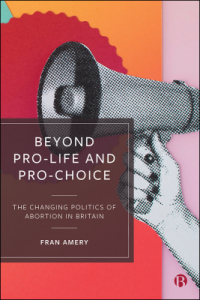On June 24 2022, the US Supreme Court voted 6-3 to overturn Roe v. Wade, the landmark ruling that had guaranteed constitutional protection of abortion rights for nearly 50 years. This has had immediate consequences, as states with pre-Roe bans on abortion, or ‘trigger laws’ designed to come into effect in the event of Roe’s fall, move to limit access to abortion. All in all, 26 US states are likely to ban or severely restrict access to abortion or have done so already.
The impact of abortion bans does not fall evenly. Those with the means to travel to states where abortion is legal may be able to mitigate some of the impacts of a ban, but those who cannot will suffer. Many disabled people may struggle to make the trip. Black women face over three times the maternal mortality rate that white women do, a figure that is likely to worsen significantly as their access to safe abortion is restricted. Meanwhile, trans people – who may themselves become pregnant and need access to abortion – also fear that the closure of abortion clinics could mean that their access to hormone therapy and reproductive healthcare is threatened. Yet proclamations on social media that wealthy white women will be fine overlook the trauma of forced abortion travel, the role that reproductive coercion can play in domestic abuse, and that all women suffer as a result of systemic misogyny.
Where should our focus be, post-Roe, and how can the average person make a difference? It is tempting to look, and donate, to large, established abortion rights groups such as the lobbying organisation NARAL Pro-Choice America or the reproductive healthcare provider Planned Parenthood. But these organisations are already well resourced – and despite this, may not be best placed to help those urgently seeking an abortion in contexts where abortion is illegal or highly restricted. The traditional forms of lobbying these groups employ can wait; what is immediately important is that the means to safely have an abortion are delivered to those in need of them.
Even before the fall of Roe, travel across state lines was a necessary reality for many living in abortion-hostile states, adding additional stress, time, and expense to the process of obtaining an abortion. Now, the Biden administration is reportedly considering new measures such as travel vouchers to assist abortion travel, as are states with liberal abortion laws such as California. Ultimately, however, anyone who cannot afford the often-prohibitive costs of interstate travel – not to mention childcare costs and time off work – may need to turn to one of the dozens of grassroots organisations supporting people to travel for abortion, coordinated by the National Network of Abortion Funds (NNAF). According to NNAF, there is a huge unmet need, with abortion funds only able to help 35% of those who called them between July 2019 and June 2020. As state abortion bans fall into place, there is a huge risk that demand will vastly outstrip what funds can provide. Donating to grassroots abortion funds must be urgently prioritised.
Travelling across state lines is, however, not the only safe way to access abortion if it’s illegal in your state. Anyone advocating for abortion rights needs to be aware of this vital development in abortion technology: medication abortion. In the wake of the Supreme Court decision, many have shared gruesome imagery of coat hangers or Higginson syringes. Yet while the fall of Roe is likely to lead to serious physical harm and even death in some cases, knee-jerk appeals to such imagery are in themselves dangerous. In 2022, most – although not all – illicit abortions should be able to be carried out safely and self-managed at home using the medication misoprostol, ideally in combination with mifepristone. It is vital that these methods are accessible, and that they are widely known about not obscured by well-intended use of coat hanger imagery.
Here, grassroots organisations have stepped in where more institutionalised groups cannot. Groups such as AidAccess and Women on Web ship abortion pills, following an online consultation and review by a medical practitioner, to pregnant women and trans people who would not be able to access abortion otherwise. Crucially, this method of abortion is extremely effective when performed in the first trimester of pregnancy, and safe.
Whether it aids travel across borders or self-managed abortion at home, the work done by grassroots organisations is vital for those immediately affected by abortion bans. Ultimately, this may even be the kind of work that leads to legislative change. In her influential 1985 book Abortion and Woman’s Choice, Rosalind Petchesky argued that states legalise abortion in order to retain their legitimacy when criminal bans can no longer be enforced, because of how many people are willing to defy the law by obtaining or providing abortions. Shipping abortion pills by post is the best hope we have to make abortion ungovernable.
Donate to NNAF here: https://secure.actblue.com/donate/supportabortionfunds?refcode=1milmatch
Donate to Women on Web here: https://www.paypal.com/donate/?hosted_button_id=J995H96F5RUX4
Fran Amery is Senior Lecturer in Politics at the University of Bath.

Beyond Pro-life and Pro-choice: The Changing Politics of Abortion in Britain is available on the Bristol University Press website. Order here for £ 13.49.
Bristol University Press/Policy Press newsletter subscribers receive a 25% discount – sign up here.
Follow Transforming Society so we can let you know when new articles publish.
The views and opinions expressed on this blog site are solely those of the original blog post authors and other contributors. These views and opinions do not necessarily represent those of the Policy Press and/or any/all contributors to this site.
Image credit: Manny Becerra on Unsplash


